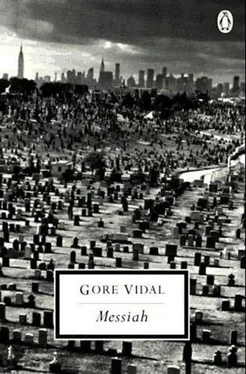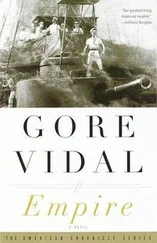Gore Vidal - Messiah
Здесь есть возможность читать онлайн «Gore Vidal - Messiah» весь текст электронной книги совершенно бесплатно (целиком полную версию без сокращений). В некоторых случаях можно слушать аудио, скачать через торрент в формате fb2 и присутствует краткое содержание. Жанр: Современная проза, на английском языке. Описание произведения, (предисловие) а так же отзывы посетителей доступны на портале библиотеки ЛибКат.
- Название:Messiah
- Автор:
- Жанр:
- Год:неизвестен
- ISBN:нет данных
- Рейтинг книги:3 / 5. Голосов: 1
-
Избранное:Добавить в избранное
- Отзывы:
-
Ваша оценка:
- 60
- 1
- 2
- 3
- 4
- 5
Messiah: краткое содержание, описание и аннотация
Предлагаем к чтению аннотацию, описание, краткое содержание или предисловие (зависит от того, что написал сам автор книги «Messiah»). Если вы не нашли необходимую информацию о книге — напишите в комментариях, мы постараемся отыскать её.
Messiah — читать онлайн бесплатно полную книгу (весь текст) целиком
Ниже представлен текст книги, разбитый по страницам. Система сохранения места последней прочитанной страницы, позволяет с удобством читать онлайн бесплатно книгу «Messiah», без необходимости каждый раз заново искать на чём Вы остановились. Поставьте закладку, и сможете в любой момент перейти на страницу, на которой закончили чтение.
Интервал:
Закладка:
Now I am able to work again. Butler pays me a daily visit, as does the doctor. Both are very kind but both tend to treat me as a thing which no longer matters. I have been written-off in their minds: I'm no longer really human since soon, perhaps in a few days, I shall not be one of them but one of the dead whose dust motes the air they breathe. Well, let it come. The fraternity of the dead, though nothing, is the larger kingdom.
I'm able to sit up in bed (actually I can get around as well or as badly as before but it tires me too much to walk so I remain abed). Sunday is here at last and from the excited bustle in the air which I feel rather than hear, Butler's colleague must have arrived. I am not ready for him yet and I have hung a "Do Not Disturb" sign on the door, composed emphatically in four languages. It should keep them out for a few days.
I have a premonition of disaster which, though it is no doubt perfectly natural at my age with the last catastrophe almost upon me, seems to be of a penultimate nature, a final human crisis. All that I have heard from Butler about this young man, this colleague of his, disposes me to fear him. For although my existence has been kept a secret from the newer generations, the others, the older ones, the chief counselors are well aware of me and though I have so far evaded their agents and though they undoubtedly assume that I am long since dead it is still possible that a shrewd young man with a career in the making might grow suspicious and one word to the older members of the hierarchy would be enough to start an inquisition which could end in assassination (ironic that I should fear that at this point!) or, more terrible, in a course of indoctrination where my apostasy would be reduced by drugs to conformity. It would be the most splendid triumph for Cave if, in my last days, I should recant: the best victory of all, the surrender of the original lutherist upon his deathbed.
Yet I have a trick or two up my sleeve and the game's not yet over. Should the new arrival prove to be the one I have so long awaited, I shall know how to act: I have planned for this day. My adversary will find me armed.
But now old days draw me back; the crisis approaches in my narrative.
4
The first summer was my last on the Hudson, at peace. Iris wrote me regularly from the Florida keys: short, brisk letters completely impersonal and devoted largely to what "he" was doing and saying. It seems that "he" was enchanted by the strangeness of the keys, yet was anxious to begin traveling again. With some difficulty, I gathered between the lines, Iris had restrained him from starting out on a world tour: "He says he wants to see Saigon and Samarkand and so forth soon because he likes the names. I don't see how he can get away yet, though maybe in the fall after his tour. They say now he can make his talks on film all at once which will mean of course he won't have to go through anything like last winter again." There followed more news, an inquiry into my health (in those days I was confident I should die early of a liver ailment: my liver of course now seems the one firm organ in my body; in any case, I enjoyed my hypochondria) and a reference to the various things I was writing for the instruction of converts and detractors both. I pushed the letter away and looked out across the river.
I was alone, awaiting Clarissa for tea. I had actually prepared tea since she never drank alcohol and I myself was a light drinker at best… a non-drinker that summer when my liver rested (so powerful is imagination) like a brazen cannonball against the cage of bones.
I sat on my porch which overlooked the lawn and the water, unlike the other houses on that river, mine had the railroad behind it instead of in front of it, an agreeable state of affairs; I don't mind the sound of trains though the sight of them on their squalid tracks depresses me.
Beside me, among the careful tray of tea things, the manuscript of my dialogue lay neglected. I had not yet made up my mind whether to read it to Clarissa or not. Such things tended to bore her; yet, if she could be enticed into attention, her opinion would be useful: such a long memory of old customs would be invaluable to me as I composed, with diligence rather than inspiration, an ethical system whose single virtue was that it tended to satisfy the needs of human beings as much as was possible without inviting chaos. I had, that morning over coffee, abolished marriage. During lunch, served me by my genteel but impoverished housekeeper (although servants still existed in those days in a few great houses, people like myself were obliged to engage the casual services of the haughty poor), I decided to leave marriage the way it was but make divorce much simpler. After lunch, suffering from a digestive-inspired headache, I not only abolished marriage again but resolutely handed the children over to the impersonal mercies of the state.
Now, bemused, relaxed, my eyes upon the pale blue Catskills and the summer green, the noise of motorboats like great waterbugs in my ears, I brooded upon the implications of what I was doing and, though I was secretly amused at my own confidence, I realized, too, that what I felt and did and wrote, though doubtless unorthodox to many, was, finally, not really the work of my own inspiration but a logical result of all that was in the world: a statement of the dreams of others which I could formulate only because I shared them. Cave regarded his own words as revelation when, actually, they only echoed the collective mind, a plausible articulation of what most men felt even though their conscious minds were antipathetic, corseted and constricted by stereotyped ways of thinking, the opposite of what they truly believed. Yet at this step I, for one, hesitated. There was no doubt but that the children and the society would be the better for such an arrangement… and there was little doubt that our civilization was moving toward such a resolution. But there were parents who would want to retain their children and children who might be better cared for by their progenitors than by even the best-intentioned functionaries of the state. Would the state allow parents to keep their children if they wanted them? If not, it was tyrannous; if so, difficult in the extreme, for how could even the most enlightened board of analysts determine who should be allowed their children and who not? The answer, of course, was in the retraining of future generations. Let them grow up accepting as inevitable and right the surrender of babies to the state. Other cultures had done it and ours could too. But I was able, vividly, to imagine the numerous cruelties which would be perpetrated in the name of the whole, while the opportunity for tyranny in a civilization where all children were at the disposal of a government brought sharply to mind the image of the anthill society which has haunted the imagination of the thoughtful for at least a century.
I had got myself into a most gloomy state by the time Clarissa arrived, trailing across the lawn in an exotic ankle-length gown of gray which floated in yards behind her, like the diaphanous flags of some forgotten army.
"Your lawn is full of moles!" she shouted to me, pausing in her progress and scowling at a patch of turf. "And it needs cutting and more clover. Always more clover, remember that."
She turned her back on me to stare at the river which was as gray as her gown, but, in its soft tidal motion, spangled with light, like sequins on a vast train.
She had no criticism of the river when she at last turned and climbed the steps to the porch; she sat down with a gasp.
"I'm boiling! Tea? Hot tea to combat the heat."
I poured her a cup. "Not a hot day at all." Actually it was very warm. "If you didn't get yourself up as a Marie Corelli heroine, you'd be much cooler."
Читать дальшеИнтервал:
Закладка:
Похожие книги на «Messiah»
Представляем Вашему вниманию похожие книги на «Messiah» списком для выбора. Мы отобрали схожую по названию и смыслу литературу в надежде предоставить читателям больше вариантов отыскать новые, интересные, ещё непрочитанные произведения.
Обсуждение, отзывы о книге «Messiah» и просто собственные мнения читателей. Оставьте ваши комментарии, напишите, что Вы думаете о произведении, его смысле или главных героях. Укажите что конкретно понравилось, а что нет, и почему Вы так считаете.












